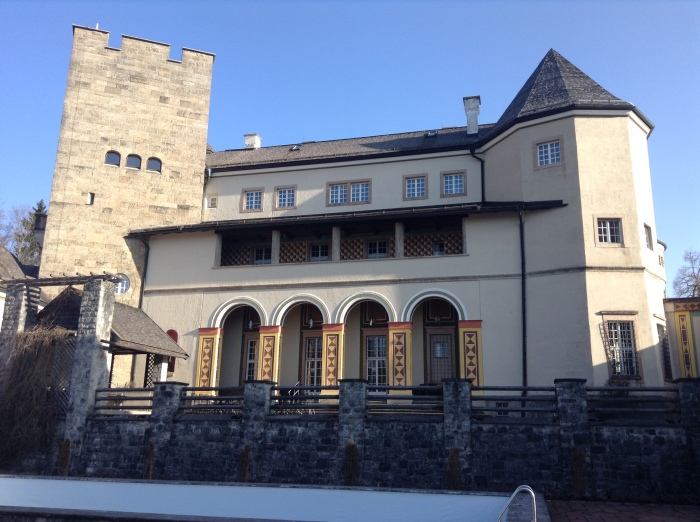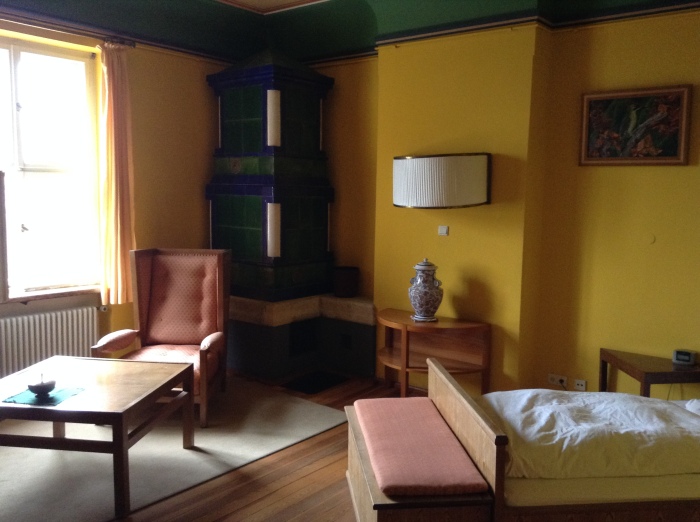Last year jules went to Schloss Ringberg in Bavaria, for a workshop on cloud feedback and sensitivity "under the auspices of the World Climate Research Programmes (WCRP) Grand Science Challenge on Clouds, Circulation and Climate Sensitivity and with the support of the Max Planck Institute for Meteorology in Hamburg, Germany." (oh, the report on that is just out coincidentally today)
A follow-up more targeted towards climate sensitivity was arranged for this year, and it seemed only fair for me to go this time. Actually, it was not so much fairness, but rather that the workshop seemed to be somewhat more closely aligned with my work and interests than hers. So although we were both invited this time round, we decided that only I would attend. This ended up with me having the undeserved privilege of two slots for presenting two rather distinct aspects of our research during the week.
I must admit I went with somewhat moderate expectations, as a number of workshops I’ve attended in the past seem to consist mostly of people talking about their own personal interests without really making progress towards shared understanding or common goals. This one turned out to be really good, however. The sessions were arranged into relevant themes and the organisers and discussion leaders did a good job of keeping things focussed around what really mattered for understanding climate sensitivity. We started with some talks about the framework(s) underlying the concept of climate sensitivity, and some discussion of their limitations. Most significantly to me, this included some strong evidence that the concept of a constant (state-independent) feedback under warming was too limited, with evidence pointing towards an increase in sensitivity with warming, and some difference between forcings. It’s one thing to be vaguely aware of some literature around this topic, but quite another to hear and participate in direct discussion with the people generating the main results. In summary, evidence based on recent obs (ie 20th century temperature trend and energy balance) do on the face of it point towards a rather low sensitivity, but adjusting for the likely change in feedback would push the estimate of equilibrium response up somewhat.
Next up was paleo, where I was due to present what is primarily jules’ work linking past to future. Unfortunately Ayako was also absent, but she did manage to send me some slides (as did Dan Lunt) and so I tried to weave them in to a somewhat broader perspective than I had originally intended. State dependence of sensitivity is a big issue here, though the paleo record does seem broadly consilient with what we see in the models and recent record. It’s hard to see how the climate can have changed as we see in the past if the sensitivity to radiative forcing (in its most general sense) was either negligibly low or extremely high.
The other main focus area was the more process-based understanding of how feedbacks (especially in the clouds, which are the dominant source of our uncertainty) worked in the real world, and how well these were simulated in models. I found this the hardest to follow and certainly couldn’t contribute usefully to the discussion, but there seemed to be a clear feeling that it was hard to justify large negative feedbacks that would bring the sensitivity below about 2C, especially when some positive feedbacks (on top of the well-established Planck response and water vapour/lapse rate feedback) seem to have been identified with some confidence. On the other hand, high sensitivity would seem to require a number of things to combine unhelpfully, which may not be impossible but is certainly not anticipated. There was also a lot of discussion about the absence of extreme models (at either end) from the CMIP archives, and what if anything could be inferred from this. I certainly subscribe to the view that this is some evidence in favour of the CMIP range being reasonable, as firstly it seems quite hard to build extreme models in the first place, and secondly, they tend to behave a bit strangely when they are investigated in any detail. But it is also possible that people converge to some extent through social effects that have no sound basis.
There was a lot of discussion on how to synthesise the different lines of evidence, and my second presentation focussed on this topic. I’m hoping to do more on this soon, as there seems to be plenty of material to revisit and improve the rather superficial analysis that we did several years ago. There are plans to revisit the workshop topics (and venue) in three years to see where have got to, which I look forward to very much. Gavin also has a summary on RC and I fully endorse his comments about the value of meeting in person (though I also think that there’s plenty of scope to expand video-conferencing, especially to enable wider access without the need for lots of travelling). Most of the talks are also on-line for anyone interested.
The food and accommodation was spectacular. The food was far better than one can usually expect in a workshop situation, with a wide range of excellently cooked fish or meat for both lunch and dinner (with the odd bottle of beer thrown in on top). It might have been a little overwhelming for some but I can handle just about anything for 5 days, helped by fitting in a couple of runs down to the lake and back. And I think all attendees found the accommodation very satisfactory too. I think I was a little luckier than some, having one of the big old suites on the first floor. I’ve no idea what I did to deserve this privilege, and was a little concerned on the castle tour, when the first room we were taken into was the one next to mine, and then we walked along the corridor…into the room just on the *other* side of my (embarrassingly untidy) room. Phew. Here it is in neater guise.
On the afternoon off, we took a cable car trip up a neighbouring mountain, which had some lovely views although not sunny as it had been previously. We also had a touch of snow but nothing like last year.
And for anyone who accuses academics of hiding away in ivory towers, I can assure you that ivory was nowhere to be seen. Marble, on the other hand…
|
Saturday, April 04, 2015
BlueSkiesResearch.org.uk: Climate sensitivity workshop at Schloss Ringberg
Labels:
blueskiesresearch,
climate sensitivity
Subscribe to:
Post Comments (Atom)




9 comments:
Did you cycle there?
No, but I only took up one person's plane seat and presented the work of 4 :-)
(um...sitting in an aiport cafe as I type...sorry...)
This was interesting: http://climateaudit.org/2015/04/13/pitfalls-in-climate-sensitivity-estimation-part-2/#comment-757574
I'm shocked, shocked that Nic would prefer the lowest possible version of our estimate :-)
I am sure such workshops like this have advanced the science of being able to produce probability statements to such an extent that the following statements can be made:
There is a one-in-ten chance of the world being 6C warmer than it is today by 2100 which would lead to cataclysmic changes in the global climate with unimaginable consequences for human civilisation, leading climate researchers have warned in an “Earth Statement”.
http://www.independent.co.uk/environment/climate-change/global-warming-experts-say-temperatures-could-rise-by-6c-by-2100-with-cataclysmic-results-10193506.html
"according to the 17 “Earth League” scientists and economists who have signed the joint statement."
gosh 17
I also quite liked
"Scientists calculate that the world has already warmed by an average of about 0.85C over the past 120 years and that a further increase of no more than 2C is the lowest that could be tolerated without running the risk of dangerous climate “tipping points” leading to further, accelerated warming."
Anyway care to calculate what climate sensitivity they believe in?
Rockstrom chairing, also Hoskins involved. Can anyone be bothered tracking down the full report that they issued?
We'd better get our Ringberg summary out asap! (joke, it won't actually say anything substantive at this stage, though I am optimistic of progress on the 3-5y time scale.)
http://earthstatement.org/statement/
That's a shame, it's short enough that I don't really have any excuse for not reading it :-) Just more of the usual, really.
I think you may be seeing social effects driving models to converge. It would be natural given human nature and the fact that it's so hard to compare model predictions to collected data. I have run very complex models in a different field and one of the biggest headaches we have is real data. To be honest, we never match all of it. We simply can't. So if you can't test the model in a 30 year run you are up the creek without a paddle. I think.
Post a Comment